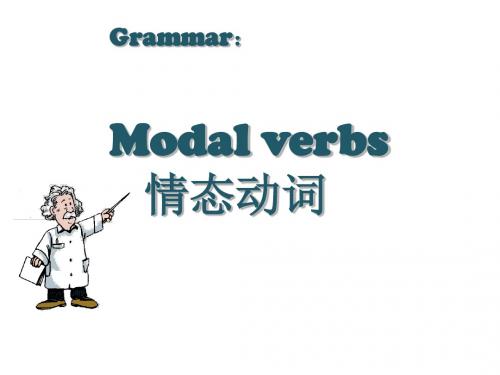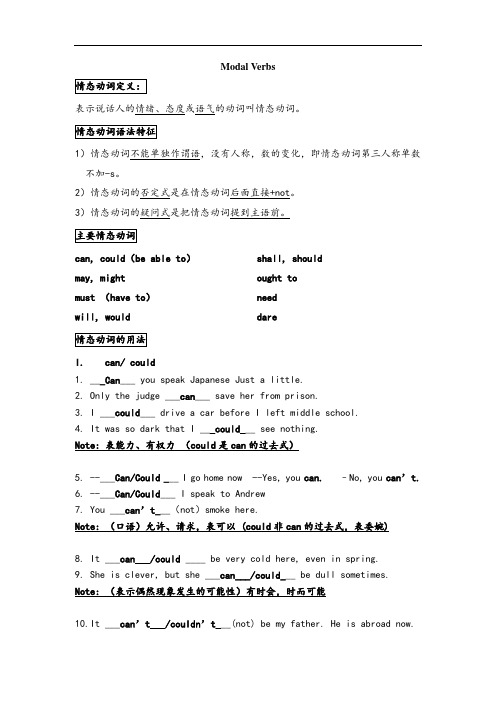专四情态动词讲解.ppt
情态动词讲解精ppt课件

will/would
详细描述:will 表示现在的意愿或 预测,would 表示过去的或虚拟 的意愿或预测。
1. I will help you with your project.(我会帮助你完成你的项 目。)
总结词:表示意愿或预测
例句
2. They would have gone to the party if they had known about it earlier.(如果他们早点 知道,他们就会去参加聚会。)
表示意愿
情态动词+动词原形,如 would like to go,表示 某人想要去。
形式变化
基本形式
情态动词的基本形式包括 现在时、过去时和将来时 。
过去式
情态动词的过去式通常是 在基本形式后面加-d或ed,如could have done 、should have done等。
将来时
情态动词的将来时通常是 在基本形式后面加-will或shall,如will be able to 、shall have to等。
may与might的区别与联系
总结词
may表示现在的许可或可能性;might表示过去的可能性或许可。
详细描述
may用于肯定句中,表示许可或可能性,例如“You may use this room.”(你可以使用这个房间。 )“The book may be in the library.”(这本书可能在图书馆里。)might表示过去的可能性,常 用于过去时态的句子中,例如“He might come tomorrow.”(他明天可能来。)
未必、很难说
She might not agree with us.
表示虚拟语气
情态动词语法 ppt课件

(3) 表示客观可能性即推测用法,多用于否定句和疑问句中, could只表示可能性比can小,不表时态。(否定推测) —Who is that man? Can it be your uncle? —No, it can’t be him. (4) can 也用在肯定陈述句中,表示理论上的可能性,意为“有 时可能会” Anybody can make mistakes. Even top students can make mistakes in the exam. 即使优秀学生在考试中也可能会出错。
ppt课件
14
(3)shall用在主语是第三人称的陈述句中,表示条约,规章,法令 等文件中表示义务或规定, 常用于官方文件中,表明具有法律效 力。(而should表示应该,义务)。 All payments shall be paid by the end of the month. 本月底所有款项必须付清。 No person shall carry a mobil phone into the examination room during the College Extrance Examination.
ppt课件 7
(2)may和might的用法
1. may和might表示请求、许可。 表示征求同意和允许,表征求同意时,might比may的语气更委 婉一些,否定回答时要用mustn’t表示“不可以”、“禁止”、“阻止” 之意。 may表示“允许”,否定形式为mustn't/can't,表示“禁止、不允 许、不可以”如: You may keep the book for a week. 这本书你可以保留一星期。 — Might I use your pen? — Yes, you may/can. —No, you mustn't/can't.
情态动词语法讲解PPT课件

2表示“许可”和“不许”
a)请求对方“许可”可用can, could, may, might.
may/might较正式,could/might较委婉
表示给予“许可”通常用can/may,而不用 could/might
Could I use your phone? Yes, of course you can. Might I trouble you for a light? You may indeed.
表示将来的“必须”,常用have to的一定 形式(will/shall have to) 比较:
•We must do it again.(表示现在)
•We’ll have to do it again.(表示将来)
•表示过去的“必须”,常用had to
•I had to leave at six yesterday.
•They must be home by now.(他们现在一定到家了)
will/would表示“推测”可有三种情况
1)对特定事态的推测
A: Who’s that man over there? B: That will be George, no doubt. C: That would be George, I except.
• Can they have missed the bus?
• Yes, they may have.
may not重音落在助动词上,表示 “不可能”,重音落在否定词上,表 示“不许可” , 比较:
•He may not go tomorrow.
•He may not go tomorrow.
•所以在书面语中,表示“不可能” 常用can’t
情态动词讲解ppt课件

1.Can this be an excuse for not giving them help? 表示惊异、怀疑、不相信 2.This can’t be true. 等态度,主要用在否定句、 3.How can you be so crazy. 疑问句和感叹句中。
考评项目赋标准分,对照考评内容和 考评办 法对考 评项目 进行考 评,评 出各考 评项目 的考评 实际得 分,考 评类目 下各考 评项目 考评实 际得分 之和为 该考评 类目的 考评实 际得分
2.表示推测时,could不是过去式,只是语气更委婉;若是推测已发生的事或过去的情况,用can/could have done
3.can和be able to辨析 can(could)和be able to都可以表示能力,意思上没有区别。但can只有现在式和过去式,而be able to则 有更多的形式。如:
考评项目赋标准分,对照考评内容和 考评办 法对考 评项目 进行考 评,评 出各考 评项目 的考评 实际得 分,考 评类目 下各考 评项目 考评实 际得分 之和为 该考评 类目的 考评实 际得分
语法 :情态动词
---Modal Verbs
考评项目赋标准分,对照考评内项目 的考评 实际得 分,考 评类目 下各考 评项目 考评实 际得分 之和为 该考评 类目的 考评实 际得分
After the accident it was a long time before she was able to walk again. The fire was very big, but most people were able to escape from the building.
I’ve always wanted to be able to speak fluent English. Those bags look really heavy, are you sure you’ll be able to carry them on your own?
《情态动词讲解》课件

1
表示能力和可能性
这一用法涉及到情态动词在表示一个
表示推测和推断
2
人或事物的能力或可能性方面的应用。
情态动词还可用来表示具有推测性质
的情况和推断。
3
表示义务和建议
情态动词可用于表示某人应该或必须
表示意愿和打算
4
做的事情,或者提出建议。
用情态动词来表达某人的意愿或打算 进行的行为。
情态动词的否定和疑问
3 同时使用情态动词和实义动词时的注意事项
了解使用情态动词和实义动词时需要注意的细节。
总结
情态动词的重要性
深入理解情态动词的重要性,以及它们在语言中 的作用。
情态动词的学习方法
提供一些有效的学习方法,帮助您更好地掌握情 态动词的用法。
参考资料
书籍推荐
推荐一些深入学习情态动词的相关书籍。
网站推荐
建议一些在线资源,以便进一步学习和练习 情态动词。
2 may/might
表示推测和推断的情态 动词。
3 shall/should
表示义务和建议的情态 动词。
4 will/would
表示意愿和打算的情态动词。
5 must
表示必须和必然的情态动词。
情态动词的用法
情态动词有多种用法,我们将详细讨论其中的一些,包括表示能力和可能性、推测和推断、义务和建 议,以及意愿和打算。
特点
情态动词具有几个典型的特点,例如它们没有人称和数的变化,并且后面跟原形动词。
情态动词的种类
情态动词有几种常见的类型,我们将深入讨论其中的几个种类,包括can/could、may/might、 shall/should、will/would以及must。
1 can/could
情态动词详解ppt课件

when she was a child.
2021精选ppt
8
3. 表示过去的能力 (1)could , was/ were able to 表示过去 一般的能力,即不表示做与未做某事。
She could / was able to sing like an angel
He should be around sixty years old. 他可
能60岁上下。
It’s nearly seven o’clock. Jack should be here
at any moment. (表示确定或期待)
2021精选ppt
15
4)should 表示推测时,表示确定或可能有 的未来或期望,即合乎理想的情况或结果。
He may not have finished the work.
He might have caught a cold.
2021精选ppt
20
5. Might have done
表示“本来可能……”,但实际上没有发生 的事。
另外,还可以表示“本应该或可以做某 事,”,含有轻微的责备语气。
You should not have swum in that sea.
that.
2021精选ppt
22
7. Needn’t have done
表示“做了本来不必去做的事情”, 注意:didn’t need to do 表示“没有必 要做而实际也免于做某事”。
You needn’t have taken a taxi here, for it was very near to my house.
情态动词全部ppt课件

A.must
B.would
C.should
D.might
19
• 翻译 • ----我能在这个房间抽烟吗? .
---- 可以。 ---- 不行,… ----Might/ May I smoke in this room?
---- Yes, you can.
---- No, you mustn’t
20
rule.
(威胁)
26
Shall 决心、承诺、警告、命令 you \he\she\they shall…..(二三人称陈述)
When the chairman turns up, nobody shall say a word. 命令 Students shall remain in their seats until the papers have been
28
5. should
1. should表示义务、职责、劝告,意 为 “应该”。
eg: You should keep your promise. Students should respect teachers.
29
2)表示说话人_惊_讶______等特殊情感。
It’s surprising that Mary should not know Lei Feng.
3.must, need没有时态,但有些情态动词如can、 may,will,have to有一般式和过去式的变化。
4. 情态动词不能单独做谓语,必须和实义动词原形 一起构成谓语。
3
情态动词的“时态”形式并不是时间区 别的 主要标志, 不少情况下, 情态动词的 现在式 形式和过去式形式都可用来表 示现在时 间、过去时间和将来时间。
英语专业四级语法专题(情态动词)ppt课件

情态动词 (+动词原形)
行为动词
1.无人称和数的变化; need 2.尤其用于:
*否定句及疑问句中;
*在if/whether之后; *或与hardly, never,
多用于肯定句;
(sb.) need to do
dare to do
.
(sth.) need to be
dare
no one, nobody连用;
A. provide
B. have provided
C. not provide D. not have provided 4
III. “may / might / must + 不定式完成式” 表示对过去事物的怀疑和推测(可用
于肯定句) She ____ fifty or so when I first met her
2
表示推测——情态动词的重要用法.情态动词对来对现在对过去
肯定的推测
~+V
~+V
~ + have done/
must/should常见must be must be doing have been doing
可能的推测
may, might
否定的推测
can’t, couldn’t
疑问的推测
can, could
劝告或命令 Must I hand it next week? No, you_____ ?
A. mustn't B. can't C. won't D. needn’t
7
V. could V.S. was/ were able to
was/ were able to表示过去有能力并且 成功地做了某事; could表示过去一般的 能力, 但不表示做或未做某事.
情态动词(讲解版)

Modal Verbs表示说话人的情绪、态度或语气的动词叫情态动词。
1)情态动词不能单独作谓语,没有人称,数的变化,即情态动词第三人称单数不加-s。
2)情态动词的否定式是在情态动词后面直接+not。
3)情态动词的疑问式是把情态动词提到主语前。
can, could(be able to)may, mightmust (have to)will, would shall, should ought to needdareI.can/ could1.___Can___ you speak Japanese Just a little.2.Only the judge ___can___ save her from prison.3.I ___could___ drive a car before I left middle school.4.It was so dark that I ___could___ see nothing.Note: 表能力、有权力(could是can的过去式)5.--___Can/Could ___ I go home now --Yes, you can.–No, you can’t.6.--___Can/Could___ I speak to Andrew7.You ___can’t___(not)smoke here.Note: (口语)允许、请求,表可以 (could非can的过去式,表委婉)8.It ___can___/could ____ be very cold here, even in spring.9.She is clever, but she ___can___/could___ be dull sometimes. Note: (表示偶然现象发生的可能性)有时会,时而可能10.It ___can’t___/couldn’t___(not) be my father. He is abroad now.11.There is someone outside. Who ___can___ it be12.You __can’t/couldn’t have seen him__ (not see) him. He was not there.13.She __ can’t/couldn’t have been ___(not be) more than six then.14.He __ can’t/couldn’t have finished___ (not finish) the work lastnight without your help.Note: 表推测(否定、疑问句)15.He __could have told__(tell) me the answer but he refused to. Note: 过去本能做而没有做16.You _cannot/ can never_________ do the work too well.17.You _cannot /can never__ be careful enough in your study.Note: cannot…too; can never... too; cannot enough再…都不为过;越…越好can & be able to区别:1. can 只有两种时态现在时can & 过去时 couldbe able to 有各种时态2. 用于一般所具有的能力,可以互换,但是当表示成功做到时,通常用be able to或manage to1.He _can/is able to_ write music.2.We shall __be able to__ finish the work soon.3.I haven’t_been able to_ find the book.4.He _could/was able to__ swim like a fish when he was young.5.I talked with her for a long time and finally I __was able to_ makeher believe me.6.The fire spread through the building quickly but everybody ___was ableto /managed___ to escape.II.may/might1.--__May___ I leave now--Yes, you __may__./Yes,please.--No, you __may not /can’t/mustn’t___.2. He asked if he _might_____ use the phone.3. We start early so that we _may/might___ arrive in time.Note: (允许、请求)可以4. __May__ you be happy all your life.Note: 祝、愿5. John is absent. He __may/might_____ be ill.6. It _may/might______ rain tomorrow or it __may/might_____ be merely cloudy.7. I can’t find my book. I _may/might have left___(leave) it in your office just now.8. You know this story very well. You _may/might have read___(read) it before.Note: 表推测9. We start early so that we ___may ___ arrive in time.10. I wrote down his telephone number so that I ___might___ remember it. Note: 表目的(用于目的状语从句中)maybe & may be11. He ___may be ___ here. I’m not sure.12. ____Maybe______ you should call him.13. –Are you going out tonight-- ____Maybe____.III.must1.You __must___ have a passport if you want to go abroad.2.Drivers __mustn’t___ drive after drinking.Note: (义务、责任、强制、命令)必须应该3.You _must_______ first finish your homework before you watch TV.4.--_Must________ I come tomorrow--Yes, you __must____.--No, you __needn’t/ don’t have to_____.Note: (说话者主观上的意愿、建议、命令等)应该、必须、务必5.Winter __must___ be followed by spring.6.All living things ___must___ die.Note: 表示客观规律不可避免性或必然性,注定要,必然(只用于肯定句)7.You __must___ be ill. I can see it from your face.8.You __must have read___(read) the book. You know the story very well.9.There’s much noise from next door. They __must be having__(have) aparty.Note: 表肯定推测Must & have to区别:1. have to 用于各种时态,还可和其它情态动词连用2. have to 表示因客观环境的迫使而不得不做某事1.-- Let’s see a movie tonight.--I’d love to, but I __have to____ take care of my mom.2. They __had to__ speed up, for the weather turned terrible.3. They will ___have to ___ get up early tomorrow.4. We may ___have to___ put off the plan.5. You ___don’t have to ___ tell him about it.不一定要6. You ___mustn’t ___ tell him about it. 一定不要IV.shall1.I __shall________ ring you as soon as I arrive.Note:将来时(第一人称)将要、会2.__Shall______ I open the window for you3.Let’s go to the cinema tonight, __shall___weNote: (在问句中表示说话人征求对方意见或提出建议,用于第一、三人称)…好么V. should & ought to1.We hoped that we __should______ be able to do that.Note: 用于过去将来时2.You _should/ought to____ be more careful next time.3._Should____ I call him and apologizeNote: (表示建议、劝告、命令、要求) 应该,必须(ought to 语气强)4.It’s 4:30. They __should______ be in New York by now.Note: (表示说话者根据一定的依据猜测、推测、推论等)该,可能5.You _should have told__(tell) me earlier about it, but you didn’t.6.You __shouldn’t have done_________ (do) that to your mother, but youdid.Note: 过去按理该…而实际没有…(常有责备、埋怨、惋惜之意)VI. will1.He _will____ come back soon.Note: 将来时2.I hope you __will____ succeed.3.I __will____ do my best to help you.Note: (表意愿、决心、承诺)要、愿、想、会、保证4.When he is in trouble, he __will______ turn to his coach for help.5.I _will___ turn you out of doors if you don’t keep quiet.Note: 状语从句VII. would1.He told us that he __would______ meet us at the airport.Note: 过去将来时2.--__Would______ you mind my smoking--Yes, _please don’t. /You’d better not. _______________.---No, __go ahead______________Note: 提出请求、邀请(委婉)3.I __would________ like to see a film tonight.4.I _would____ rather not leave you here.5._Would __ you please _not smoke____(not smoke) hereNote: 意愿、决心、喜欢等6.He _would_________ be delighted if I went to see him.7.If you had come earlier, you _would have seen__(see) him.Note: 条件句(虚拟)8.When he was young, he __would__often __walk___ (walk) in these woods. Note: (表过去习惯性、经常性的行为或动作)总是VIII. need (情态动词没有过去式)Note: 1) need 作实意动词,有人称、时态和数的变化2) need 作情态动词,只能用在否定句和疑问句中,没有人称、时态和数的变化need sth don’t need sth Do … need sthneed to do don’t need to do Do …need to do…needn’t do Need …do …1.He __needs to_________(go) there now.2.He _need not/ doesn’t need to go__ (not go) there now.3.--__Need_/Does ______he ____go_/need to go___(go) there now-- Yes, he _must__/does______.--No, he _needn’t_/doesn’t________.4. He needs to finish the work by Friday, ___doesn’t______ he5. He needn’t stay there, __need_______ he6.He __needn’t have given_____ (not give) her so much money at the time,and now he regrets it.Note: needn’t have done过去本不必做却做了need doing & need to be done7.I _need to__ (repair) the computer.The computer __needs repairing_____.(repair)The computer __needs to be repaired____(repair)IX. dare (情态动词有过去式dared)Note: 1) dare作实意动词,有人称、时态和数的变化2) dare作情态动词,只能用在否定句和疑问句中,没有人称和数的变化,但有过去时。
专四情态动词讲解共33页PPT

专四情态动词讲解
▪
26、要使整个人生都过得舒适、愉快,这是不可能的,因为人类必须具备一种能应付逆境的态度。——卢梭
▪
27、只有把抱怨环境的心情,化为上进的力量,才是成功的保证。——罗曼·罗兰
▪
28、知之者不如好之者,好之者不如乐之者。——孔子
▪
29、勇猛、大胆和坚定的决心能够抵得上武器的精良。——达·芬奇
▪
30、意志是一个强壮的盲人,倚靠在明眼的跛子肩上。——叔本有两个……公平和实用。——伯克 7、有两种和平的暴力,那就是法律和礼节。——歌德
8、法律就是秩序,有好的法律才有好的秩序。——亚里士多德 9、上帝把法律和公平凑合在一起,可是人类却把它拆开。——查·科尔顿 10、一切法律都是无用的,因为好人用不着它们,而坏人又不会因为它们而变得规矩起来。——德谟耶克斯
- 1、下载文档前请自行甄别文档内容的完整性,平台不提供额外的编辑、内容补充、找答案等附加服务。
- 2、"仅部分预览"的文档,不可在线预览部分如存在完整性等问题,可反馈申请退款(可完整预览的文档不适用该条件!)。
- 3、如文档侵犯您的权益,请联系客服反馈,我们会尽快为您处理(人工客服工作时间:9:00-18:30)。
• (2) can’t/couldn’t have +过去分词,表示对已发生 情况的否定推测,译为“(昨天)一定没……”。 如:
• Mary couldn’ t have received my letter; otherwise she would have replied before now
个句型的变体cannot…over…。如: • You cannot be too careful when you drive a car. • The final chapter covers organizational change and
development. This subject cannot be overemphasized.
• • (3)usedn’t或didn’t use to为used to (do)的否定式。 • • (4)should 除了“应该”一层意思外,大纲还规定要掌握其“竟然”
的意思。如:
• I didn’t expect that he should have behaved like that •
• 情态动词一般用法的否定:
• (3) may/might have +过去分词,表示对已发生的事 情做不肯定、可能性很小的推测,或事实上根本没 发生,译为“也许……”。如: At Florida Power’s Crystal River plant, a potentially serious leakage of radioactive water may have been unknowingly caused by an electrician.
• mustn’t
不准, 禁止,不要 can’t
(couldn’t) 不会;不能;
• may (might) not 不可以;
• needn’t
没必要 ( = don’t have to )
• used not/usedn’t to或didn’t use to… 过 去不…
• dare not
不敢
• *情态动词+have+过去分词结构表示轻微的责备和后悔
情态动词
• *情态动词: will(愿意), shall(将), must(必须), can, may, would, should(应 该), might, could, ought to, used to(过去 常常), need(需要), dare(竟敢), have to(不得不)
• 1.表示已经发生的情况
未做,译为“(那样)也许会……”。如:
• It might have been better to include more punchy statistics and photos of equipment in the introduction to further assist first-time office automation managers.
•
• 3.几个情态动词常考的句型
•
• (1)may/might (just) as well“不妨,最好”,与had better相近。 如:
• Since the flight was cancelled, you might as well go by train. • • (2)cannot/can’t…too… “越……越好,怎么也不过分”。注意这
• • (4) could have+过去分词,表示过去本来可以做但却未做,
译为“完全可以……”。如:
• What you said is right, but you could have phrased it more tactfully.
• • (5)may/might have + 过去分词,表示过去可以做但实际
• 肯定:过去应该做而没有做;
• 否定:过去不该(不必)做而做了。
• ⑴ might/could+have+过去分词:“本来可以,早就应该”
• (只用于肯定句,且不能用may, can)
•
You could have told me you were going to be late!.你应
• (1) must have +过去分词,表示对已发生情况的肯定 推测,译为“(昨 天)一定……”。如:
• My pain must have been apparent the moment I walked into the room, for the first man I met asked sympathetically: “Are you feeling all right?”
•
例:I didn’t need to get up early, so I got up until 9 a.m.
• (2) should /should not have +过去分词,表示应该做某事但 实际上未做,或本不应该做但实际上做了, 译为“本(不)应 该……”。如:
• I regret having left the work unfinished; I should have planned everything ahead carefully.
•
• (3) ought to have+过去分词,表示动作按理该发生了,但 实际上未发生,译为“该……”,与should的完成式含义 类似。如:
• The porter ought to have called t he fire-brigade as soon as he saw the fire in the stock, which went 虚拟语气
• (1) needn’t have+过去分词,表示做了不必做的事,译为“其 实没必要……”。如:
• As it turned out to be a small house party, we needn’t have dressed up so formally.
• 注意:did not need to do 动作并没发生
